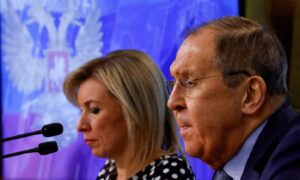World
Russian missile attacks kill at least 41, hit children’s hospital, Ukraine says
Zelenskiy, addressing a news conference in Warsaw alongside Polish Prime Minister Donald Tusk, called on Kyiv’s Western allies to give a firm response to the attack.
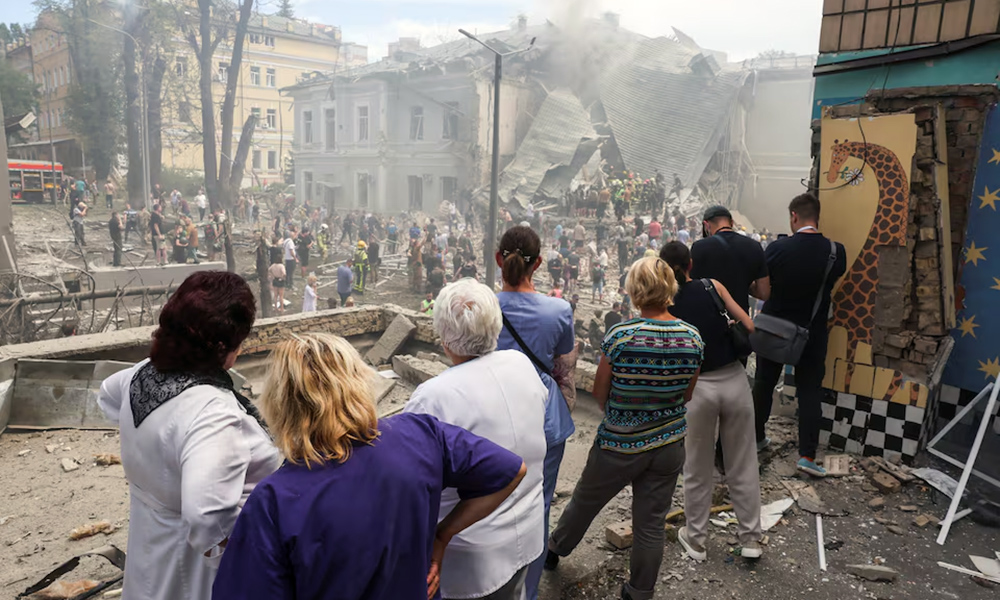
Russia blasted the main children’s hospital in Kyiv with a missile in broad daylight on Monday and rained missiles down on other cities across Ukraine, killing at least 41 civilians in the deadliest wave of air strikes for months, Reuters reported.
Parents holding babies walked in the street outside the hospital, dazed and sobbing after the rare daylight aerial attack. Windows had been smashed and panels ripped off, and hundreds of Kyiv residents were helping to clear debris.
“It was scary. I couldn’t breathe, I was trying to cover (my baby). I was trying to cover him with this cloth so that he could breathe,” Svitlana Kravchenko, 33, told Reuters.
President Volodymyr Zelenskiy, who stopped in Poland before heading off to Washington for a NATO summit, put the death toll at 37, including three children. More than 170 were injured.
But tallies of casualties from the sites of attacks in different regions totalled at least 41.
Writing on the Telegram messaging app, Zelenskiy said more than 100 buildings had been damaged, including the children’s hospital and a maternity centre in Kyiv, children’s nurseries and a business centre and homes.
“The Russian terrorists must answer for this,” he wrote. “Being concerned does not stop terror. Condolences are not a weapon.”
The Interior Ministry said there had also been damage in the central cities of Kryvyi Rih and Dnipro and two eastern cities.
The government proclaimed a day of mourning on Tuesday for one of the worst air attacks of the war, which it said demonstrated that Ukraine urgently needed an upgrade of its air defences from its Western allies, read the report.
Air defences shot down 30 of 38 missiles, the air force said.
An online video obtained by Reuters showed a missile falling towards the children’s hospital followed by a large explosion. The location of the video was verified from visible landmarks.
The Security Service of Ukraine identified the missile as a Kh-101 cruise missile.
Kyiv’s military authorities said 27 people had died in the capital, including three children, and 82 were wounded in the main missile volley and a strike that came two hours later.
Kyiv Mayor Vitali Klitschko said the attack was one of the largest of the war, causing damage in seven city districts. The Health Minister said five units of the children’s hospital were damaged and children were evacuated to other facilities, Reuters reported.
Eleven were confirmed dead in the Dnipropetrovsk region and 68 were wounded, regional officials said. Three people were killed in the eastern town of Pokrovsk where missiles hit an industrial facility, the governor said.
Zelenskiy, addressing a news conference in Warsaw alongside Polish Prime Minister Donald Tusk, called on Kyiv’s Western allies to give a firm response to the attack.
“We will retaliate against these people, we will deliver a powerful response from our side to Russia, for sure. The question to our partners is: can they respond?” Zelenskiy said.
The attack came a day before leaders of NATO countries were due to begin a three-day summit, with the war in Ukraine one of the focuses, read the report.
U.S. President Joe Biden said that Moscow’s deadly missile strikes in Ukraine, including on the children’s hospital in Kyiv, were “a horrific reminder of Russia’s brutality”.
In a statement released by the White House, Biden added that Washington and its NATO allies would be announcing new measures to strengthen Ukraine’s air defences.
Diplomats said the United Nations Security Council would meet on Tuesday at the request of Britain, France, Ecuador, Slovenia and the United States.
The UN High Commissioner for Human Rights, Volker Türk, deplored the attacks, saying: “Among the victims were Ukraine’s sickest children.”
Russia’s Defence Ministry said its forces had launched strikes on defence industry targets and aviation bases.
Moscow has repeatedly denied targeting civilians and civilian infrastructure, although its attacks have killed thousands of civilians since it launched its invasion in February 2022.
Ukraine’s Prosecutor General said he discussed the attacks with International Criminal Court Prosecutor Karim Khan, adding that his office would be sharing evidence with the ICC.
Ukraine’s Defence Minister Rustem Umerov said Ukraine still lacked enough air defences and urged Kyiv’s allies to supply more systems promptly to protect cities from Russian attacks.
Air Force representative Colonel Yuri Ignat said it became more difficult to repel Russian attacks as Moscow’s forces kept enhancing their bombardment tactics.
“Enemy missiles are equipped with additional means, including radar and thermal traps,” Ignat wrote on Facebook.
The missiles flew at extremely low altitudes during Monday’s attacks, he said.
DTEK, the largest private power producer, said three electricity substations and networks had been damaged in Kyiv.
The power system has already sustained so much damage from targeted Russian air strikes that began in March that electricity cuts have become widespread.
Related Stories:
Biden, Zelenskiy inch toward NATO with 10-year defense agreement
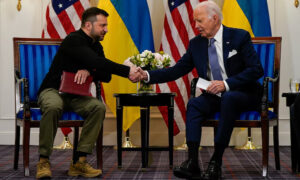
Russia says US facing humiliation in Ukraine like in Vietnam and Afghanistan
World
Israel kills Hezbollah official in deadly Beirut airstrike

An Israeli airstrike killed four people including a Hezbollah official in Beirut’s southern suburbs on Tuesday, a Lebanese security source said, further testing a shaky ceasefire between Israel and Iran-backed Hezbollah.
The Israeli military said the official – Hassan Bdeir – was a member of a Hezbollah unit and Iran’s Quds Force, and he had assisted the Palestinian group Hamas in planning a “significant and imminent terror attack against Israeli civilians,” Reuters reported.
The Lebanese security source said the target was a Hezbollah figure whose responsibilities included the Palestinian file. The Lebanese health ministry said the strike killed four people – including a woman – and wounded seven others.
It marked Israel’s second airstrike in the Hezbollah-controlled suburb of Beirut in five days, adding to strains on the U.S.-brokered ceasefire that ended last year’s devastating conflict.
The attacks on Beirut’s southern suburbs have resumed at a time of broader escalation in the region, with Israel having restarted Gaza strikes after a two-month truce and the United States hitting the Iran-aligned Houthis of Yemen in a bid to get them to stop attacking Red Sea shipping.
Hezbollah lawmaker Ibrahim Moussawi said the Israeli attack amounted to “a major and severe aggression that has escalated the situation to an entirely different level”.
Speaking in a televised statement after visiting the building that was struck, he called on the Lebanese state to “activate the highest level of diplomacy to find solutions”.
Israeli Foreign Minister Gideon Saar said the eliminated Hezbollah operative posed “a real and immediate threat”. “We expect Lebanon to take action to uproot terrorist organizations acting within its borders against Israel,” he said.
Israel dealt severe blows to Hezbollah in the war, killing thousands of its fighters, destroying much of it arsenal and eliminating its top leadership including Hassan Nasrallah.
Hezbollah has denied any role in recent rocket attacks from Lebanon towards Israel, including one that prompted Israel to carry out an airstrike on the southern suburbs last Friday.
Tuesday’s strike in the early hours appeared to have damaged the upper three floors of a building, a Reuters reporter at the scene said, with the balconies of those floors blown out.
The glass on the floors below was intact, indicating a targeted strike. Ambulances were at the scene as families fled to other parts of Beirut.
There was no advance warning, in contrast to the attack on Friday when the Israeli military announced which building it intended to hit and ordered residents to leave the area.
Lebanese President Joseph Aoun condemned the latest airstrike, calling it a “dangerous warning” that signals premeditated intentions against Lebanon, which would intensify diplomatic outreach and mobilise international allies.
Lebanese Prime Minister Nawaf Salam said the strike was a flagrant breach of a U.N. Security Council Resolution upon which the ceasefire was based, and the ceasefire arrangement.
U.S. BACKS ISRAEL
The ceasefire agreement demanded that southern Lebanon be free of Hezbollah fighters and weapons, that Lebanese troops deploy into the area, and that Israeli troops withdraw.
But each side accuses the other of failing to implement the terms fully. Israel says Hezbollah still has infrastructure in the south, while Lebanon and Hezbollah say Israel is occupying Lebanese soil by not withdrawing from five hilltop positions.
The U.S. State Department said that Israel was defending itself from rocket attacks that came from Lebanon and that Washington blamed “terrorists” for the resumption of hostilities.
“Hostilities have resumed because terrorists launched rockets into Israel from Lebanon,” a State Department spokesperson said in an email, responding to a question from Reuters seeking reaction to Tuesday’s airstrike. Washington supported Israel’s response, the spokesperson said.
The Israel-Hezbollah conflict was ignited when Hezbollah opened fire in support of Hamas at the start of the Gaza war. It escalated in September when Israel went on the offensive, declaring the aim of securing the return home of tens of thousands of people evacuated from homes in the north.
The war uprooted more than a million people and killed at least 3,768 people in Lebanon, according to a Lebanese health ministry toll from November. Dozens more have been reported killed by Israeli fire since the ceasefire.
Lebanon’s figures do not distinguish between civilians and fighters.
During the war, Hezbollah strikes killed 45 civilians in northern Israel and the Israeli-occupied Golan Heights. At least 73 Israeli soldiers were killed in northern Israel, the Golan Heights, and in combat in southern Lebanon, according to Israeli authorities.
World
Trump says Zelenskiy wants to back out of critical minerals deal

U.S. President Donald Trump said on Sunday Ukrainian President Volodymyr Zelenskiy wants to back out of a critical minerals deal, warning the Ukrainian leader would face big problems if he did.
“He’s trying to back out of the rare earth deal and if he does that he’s got some problems, big, big problems,” Trump told reporters.
“He wants to be a member of NATO, but he’s never going to be a member of NATO. He understands that.”
(Reuters)
World
South Korea, China, Japan seek regional trade amid Trump tariffs

South Korea, China and Japan held their first economic dialogue in five years on Sunday, seeking to facilitate regional trade as the three Asian export powers brace from U.S. President Donald Trump’s tariffs.
The countries’ three trade ministers agreed to “closely cooperate for a comprehensive and high-level” talks on a South Korea-Japan-China free trade agreement deal to promote “regional and global trade”, according to a statement released after the meeting.
“It is necessary to strengthen the implementation of RCEP, in which all three countries have participated, and to create a framework for expanding trade cooperation among the three countries through Korea-China-Japan FTA negotiations,” said South Korean Trade Minister Ahn Duk-geun, referring to the Regional Comprehensive Economic Partnership.
The ministers met ahead of Trump’s announcement on Wednesday of more tariffs in what he calls “liberation day”, as he upends Washington’s trading partnerships.
Seoul, Beijing and Tokyo are major U.S. major trading partners, although they have been at loggerheads among themselves over issues including territorial disputes and Japan’s release of wastewater from the wrecked Fukushima nuclear power plant.
They have not made substantial progress on a trilateral free-trade deal since starting talks in 2012.
RCEP, which went into force in 2022, is a trade framework among 15 Asia-Pacific countries aimed at lowering trade barriers.
Trump announced 25% import tariffs on cars and auto parts last week, a move that may hurt companies, especially Asian automakers, which are among the largest vehicle exporters to the U.S.
After Mexico, South Korea is the world’s largest exporter of vehicles to the United States, followed by Japan, according to data from S&P.
The ministers agreed to hold their next ministerial meeting in Japan.
(Reuters)
-

 Business4 days ago
Business4 days ago36 mining contracts inked over the past year: Mines ministry
-
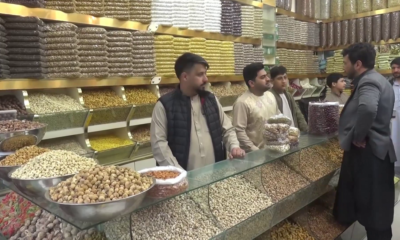
 Latest News4 days ago
Latest News4 days agoDried fruit market in Herat booms ahead of Eid-al-Fitr
-
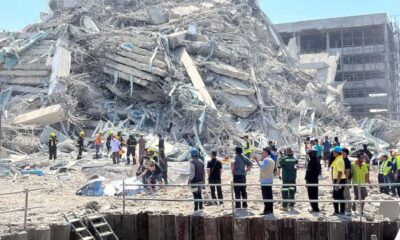
 Regional4 days ago
Regional4 days agoPowerful quake in Southeast Asia kills several, Myanmar declares state of emergency
-

 Latest News4 days ago
Latest News4 days agoUS may ask for military equipment left behind in Afghanistan: Trump
-

 International Sports4 days ago
International Sports4 days agoLucknow’s six-hitting machine Pooran justifies top order slot
-

 Latest News3 days ago
Latest News3 days agoMore than 70,000 Afghans returned home in third week of March: IOM
-

 Latest News4 days ago
Latest News4 days agoNegotiations with Afghanistan are the only way forward: Pakistan’s ex-PM Khan
-

 Health3 days ago
Health3 days agoGlobal organizations warn of health crisis due to aid cuts in Afghanistan

